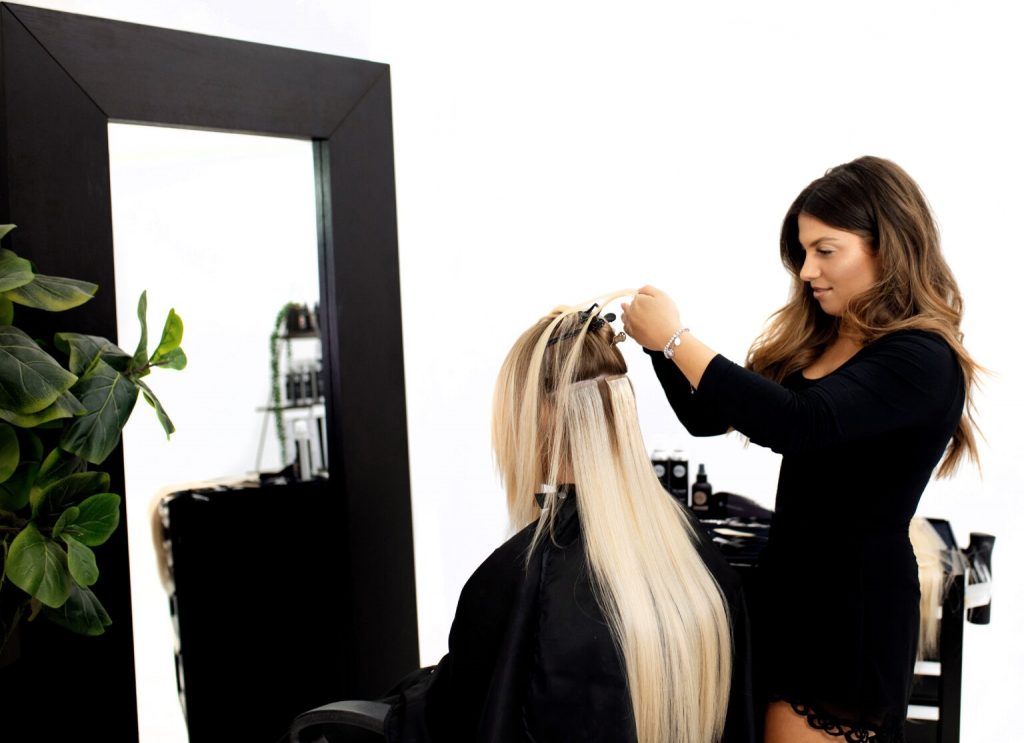
Some women are simply genetically blessed and can grow out long, lushes, healthy locks of hair. Others are not so fortunate and, as they grow their hair, it becomes damaged, brittle, frizzy and breaks easily. The women who were not gifted genetically still want to show off beautiful hair and one way to do this is with hair extensions. Extensions are offered at many, but certainly not all, salons which provide hair services. Therefore, if you have considered adding this service to your salon and maybe do not know where to start, here we will discuss the basics.
How Hair Extensions Are Secured
Fusion (or bonded) – Hair extensions which are fused or bonded use individual keratin-tipped strands of hair which are then fused to the natural hair of the client using heat.
Taped Hair Extensions – Taped hair extensions use double-sided tape to secure the hair extensions to the client’s natural hair in small sections.
Sew-in Extensions (Weave) – Sew-in or weave extensions are performed by first braiding the client’s natural hair from ear to ear and then sewing the extensions into the braids using thread.
Which type of these hair extensions is best will depend on the client and the client’s budget. For instance, weave extensions work best for African-American hair because it is dense and strong enough to hold the weave in place through braids. This type of weave application will last about 3 months and is also one of the most economical. Tape-in hair extensions are similarly economical and also one of the quickest to apply. Fusion extensions are the most expensive and time-consuming to apply but also last the longest (about four months). However, with fusion extensions, the hair from the extensions can only be used once whereas with other applications such as weave, the hair can be reused.
Types Of Extensions
There are essentially two types of extensions which are natural human hair and synthetic hair. Synthetic hair tends to be much less expensive but the results are not pleasing to everyone. Human hair, especially if it is long, thick and of high quality tends to be much more expensive. Therefore, which type of extensions are most appropriate will depend on the budget and desired results of the client. It is also worth noting that human hair extensions tend to hold their style much longer. With certain applications (such as sewn-in or taped-in) of hair extensions, human hair can last and be used for up to a year whereas synthetic hair will generally only last for 3 to 6 months. Also, there are extension blends of human and synthetic hair available. However, some people do not like these extensions as there tends to be a visible contrast between the human hair and the synthetic hair as the mixed extensions age.
How To Decide What Extensions To Recommend To Clients
Extensions, both natural and synthetic, come in all shapes and sizes and so it can be hard to decide which extensions might be best for your client. As we briefly discussed above, natural hair extensions tend to last longer, but also tend to be more expensive. However, natural extensions also have other advantages such as the fact that they can be used with more styling products and devices such as hot straighteners and curling irons. Most synthetic extensions, on the other hand, cannot be used with a wide variety of styling products, especially devices which use heat. Therefore, if styling with such devices is important for your client or is part of their regular beauty routine, it may be better to recommend natural hair extensions. There are a few synthetic hair extensions which can be used with hot styling devices and these extensions will be specifically labeled as such. One advantage that synthetic extensions have over natural extensions is that they are easier to keep clean. They also tend to hold better in hot and humid weather where natural hair may lose its form and style more. You should always discuss the expectations and budget of your client before deciding what type of extensions to recommend.
Conclusion
Since most salons charge between $200 and $600 dollars for extensions services and the overall costs to the client can be much more if they are looking for significant amounts of the highest quality “Remy” hair, extension services can certainly be a positive addition to your salon. This is especially true if you find a good, reliable, economical source for the extensions themselves. In this case, you can earn profit on the hair extensions themselves as well as your professional services. However, you will want to be sure you are well-trained in providing extension services first since making a mistake with an expensive bundle of high-quality hair will certainly hurt your bottom line if your mistake renders the hair unusable.